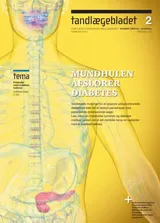Sammenhængen mellem marginal parodontitis og hjerte-kar-sygdom
Iskæmisk hjertesygdom skyldes forkalkningsprocesser i koronararterierne, idet der dannes ateromatøse plakker, der kan være stabile eller ustabile. Udviklingen af sygdommen ved ustabile plakker kan stimuleres af inflammation, og ved denne tilstand kan trombocytter og leukocytter trænge ind gennem karvæggen og medføre trombedannelse med okklusion af karret. Herved opstår et infarkt i hjertemuskulaturen. Inflammationen formidles af inflammationsmediatorer, der kan syntetiseres på stedet eller andre steder i organismen. Derved kan spill-over af inflammationsmediatorer fra parodontiet tænkes at spille en rolle for forløbet af iskæmisk hjertesygdom. Desuden kan parodontale patogener ved bakteriæmi tænkes at blive overført til de ateromatøse plakker og derved iværksætte inflammation i koronarkarrene. Da parodontal inflammation kan påvirke lipidmetabolismen, er der også herved mulighed for, at marginal parodontitis kan influere forløbet af iskæmisk hjertesygdom.
Connection of periodontitis with coronary heart disease
Coronary heart disease is due to formation of atheromatous plaques in the walls of the coronary arteries. These plaques may be stable or unstable, the latter condition being associated with risk of disease progression. The conversion from stable to unstable plaque is stimulated by inflammation. Unstable plaque may be associated with migration of thrombocytes and leukocytes through the vessel wall resulting in thrombus formation and occlusion of the vessel whereby an infarct of the heart musculature occurs. Inflammation is brought about by inflammatory mediators, cytokines, which may be synthesized in the area or in other parts of the body. Thereby spill-over of cytokines from the periodontium may play a part in the course of coronary heart disease. Also, bacteremia associated with periodontal disease may result in transferral of periopathogens to the atheromatous plaques where the bacteria may provoke inflammation in the coronary arteries. Since also periodontal inflammation seems to influence lipid metabolism, we may conclude that periodontal disease may initiate or influence the development of coronary heart disease.


